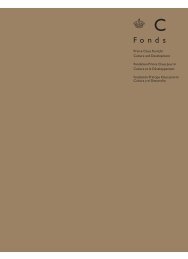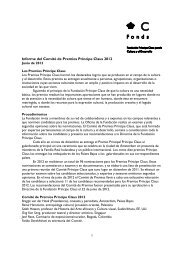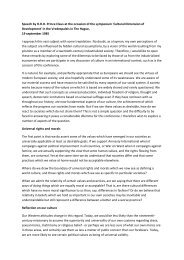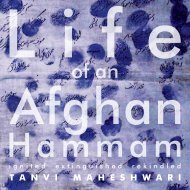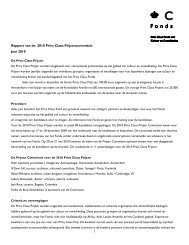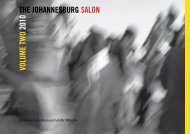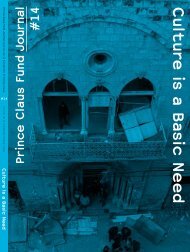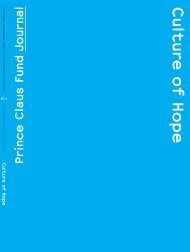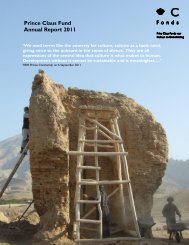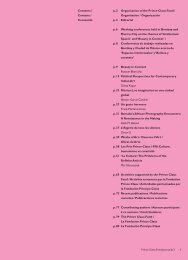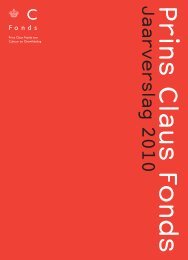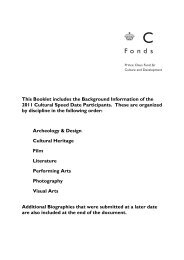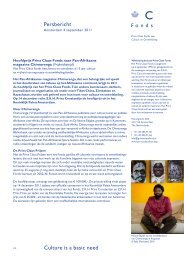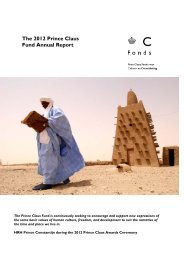Critical Humanismin a Multicultural Worldby Carlos FuentesYour Majesty,Your Royal Highness,Your Excellencies,Ladies and Gentlemen,It is a very high honour indeed for me to address you today, as the keynotespeaker at this ceremony marking the announcement of the 1998 <strong>Prince</strong> <strong>Claus</strong>Awards. I come to you as a citizen of Mexico, a Latin American and a writer in theSpanish language. The greatest Spanish author, Miguel de Cervantes, is also thegreatest literary descendant of the Dutch thinker who shaped, throughCervantes, the literature that we write in Latin America today: Erasmus ofRotterdam, with his “Praise of Folly” and his conviction that, in a humanisticuniverse, neither reason nor faith can be absolutes, since both are - and shouldbe - the object of critical and ironical imagination.Personally, I am not a stranger to this wonderful nation, the Netherlands, sincemy parents were the Mexican Ambassadors to The Hague in the 1960s, andmaintained the highest regard and fondest memories, Your Majesty, of yourparents Queen Juliana and <strong>Prince</strong> Bernhard.Furthermore, as a lawyer I am steeped in the works of the great founder ofinternational law, Hugo Grotius, and, as a cultural citizen, in those of yourmagnificent painters, from Rembrandt and Vermeer to an artist extremely closeto my own literature, Hyeronimus Bosch; while, on my first visit to this beautifulcountry after the bleak years of the Second World War, I soon discovered akinship with the imagination of your great post-war novelist, Willem FredrikHermans, an admiration which I have maintained and renewed to this day in thesplendid novels of my most admired contemporary Cees Noteboom. Thank you,then, for receiving me back in a country for which I have such great affection.We meet at the doors of a new century and a new millennium and, as never beforein the 20th Century, we have the strong sensation that something is ending andsomething is beginning.This has been, in the words of the British historian Eric Hobsbaum, ‘the shortestcentury’ - a century of barely eighty years, beginning in Sarajevo in 1914 onlyto end, again in Sarajevo, in 1994.Compare it with the latitude of the 19th Century, which began, according totaste, with the American Revolution of 1776 or with the French Revolution ofl789, only to end, with the Guns of August, in 1914: a century of as much as 138and at least 125 years. Ours has been a short century and a cruel century.The unlimited faith in progress and human happiness announced by theEnlightenment of the 18th Century and sustained by the optimism of the l9thCentury, did not prepare us for the horrors of the 20th Century. 9 Million dead inthe trenches of World War I. 3 Million Jews murdered in the Nazi holocaust.Countless millions sacrificed in the purges and the Gulag of Sta1inist Russia. Andnumberless, as well, the victims, tortured, murdered, disappeared, of the LatinAmerican dictatorships.A short century, a cruel century, and a paradoxical century: Never hastechnological and scientific advancement been greater, never has moral andpolitical regression been more damaging, never has the chasm between them been<strong>Prince</strong> <strong>Claus</strong> <strong>Fund</strong> Reader #1 · Summer <strong>2011</strong> · 86
deeper. A short century, a cruel century and perhaps even a wasted century.Twelve of the eighty years of our century were lost in bloody world wars andanother forty-five in a cold war that placed us all on the threshold of nucleardisaster and which, in the name of competing ideologies, postponed urgent social,economic and cultural problems.Now that the Cold War is over, these problems have reappeared with a vengeance,demanding the attention that, to our peril, we denied them for so long. Theseare concrete problems having to do with the ecology, the population explosion,the rights of women, the increasing divide between the developed and developingworlds and, within each of them, a third world within the First world and a firstworld within the Third world, amounting to a generalized crisis of urbancivilization, embracing the plight of the homeless, and the aged, crime andviolence, declining standards of education, decaying infrastructures, unyieldingpandemics and the uncontrollable drug trade.This is the new reality of the world. It lacks a new legality. Nation, state, internationallaw, public sector, private sector, civil society: all of these traditionaljurisdictions of socioeconomic problems are questioned, in crisis, and calling outfor a new legality in a new reality. We are groping for answers. We are, as theFrench poet Alfred de Musset said, in the transition from the Napoleonic Warsto the bourgeois, industrialized and nationalistic societies that followed therevolutionary period, we are unsure if our feet touch a furrow or a ruin.The question I am proposing today requires this critical background and incitesa historica1 answer. The land on which the French poet set foot is ours, always ours:it is the territory between past and future, or rather, it is the present whichcan not be understood without the memory of the past or the hope of the future.We are in the world. In it, we are free because we can act. But in it, we are notfree because we must die. Civilizations live or perish because of their capacityof failure to overcome the certainty of death with the continuity of life, handeddown from generation to generation and from people to people, through theprocess we call ‘culture’ and through humanism and creativity as the names wegive to the concrete action of continuing life beyond death and of living, inthe present, both the past we recall and the future we desire.As we rush, blindly at times, into a new century and a new millennium, let us recallthat the future has a past - that we can not have a living future with a deadpast - and that the past, especially in moments of high exuberance, holds manylessons teaching us to temper our confidence and take heed of the tragicdimension of mankind and its history. That is why I wish to centre my words hereon the twin concepts of humanism and creativity - the right and the left handsof culture - as the basis for transcending differences and crafting a globaltapestry.Creativity and humanism can be defined as widely as the Oxford Dictionary does.Humanism is ‘a devotion to the studies which promote human culture’. This cansound awfully abstract, though until you give the word a historical context. Weall know that ‘humanism’ is a concept historically defined by the EuropeanRenaissance, and perhaps the single most striking declaration of humanist independencefrom the fetters of medieval scholasticism can be found in MarsilioFicino the Florentine writer of the 15th century: ‘All is possible’, Ficino loudlyproclaimed so that his age and all the ages, could hear him. ‘All is possible. Nothingshould be disdained. Nothing is incredible. Nothing is impossible. The possibilitiesthat we deny are but the possibilities that we ignore.’ He could be voicing theoptimism of today’s global universe of communication.Yet Ficino, after praising the possibilities of humanism, opens the gates ofadversity. Things can go terribly wrong, even with the best humanist intentions87 · <strong>Prince</strong> <strong>Claus</strong> <strong>Fund</strong> Reader #3 · Summer <strong>2011</strong>



